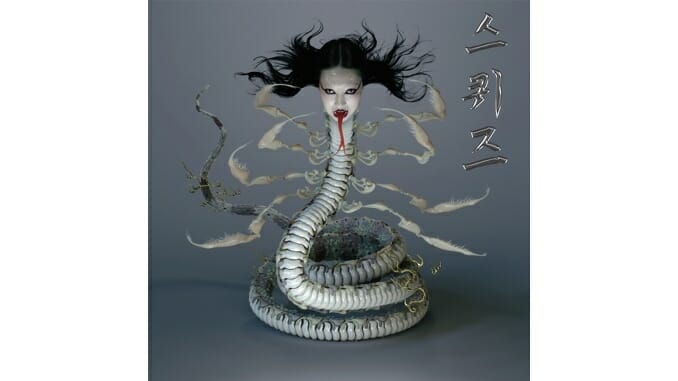SASAMI’s Squeeze Is a Metallic Urn for the Ashes of Rage
On her second LP, the Los Angeles musician swaps her debut’s shoegaze for more aggressive sounds—and creates her best songs yet

In a 2021 Ringer oral history on alt-metal band System of a Down’s sophomore album Toxicity, exactly one non-metal musician was quoted—or at least she wasn’t a metal musician at the time. “System of a Down taps this super-dark energy then puts it towards something they have real rage about, like all the insecurity and political toxicity of their homeland, and the state of human existence,” said Sasami Ashworth, aka SASAMI. On her sophomore LP Squeeze, the 31-year-old Los Angeles musician emulates her idols, mostly ditching the yearning shoegaze and dream-pop of her self-titled 2019 debut for metal, industrial and grunge. Through these newly loud and aggressive sounds—Ashworth has also played synth in Cherry Glazerr and, in a couple of TV appearances, Japanese Breakfast—she forges a space in which one can combine their own rage with hers and feel newly liberated through group catharsis, without inflicting any real-world violence. The maelstrom of distorted guitars and pounding percussion results in her best songs yet.
While writing Squeeze, Ashworth dug deeper into how her Zainichi ancestors—Koreans living in Japan, sometimes as a result of forced relocation—have been mistreated and marginalized. The anger she felt dovetailed with her learning about how the Japanese y?kai folk spirit nure-onna—part snake, part woman—spares good people and annihilates bad ones. On “Skin a Rat,” Ashworth’s ire is similarly specific and targeted: As Megadeth drummer Dirk Verbeuren goes absolutely off behind the kit, Ashworth and her backing vocalists—comedian Patti Harrison, who directed the video for Squeeze’s lurching metal cover of Daniel Johnston’s “Sorry Entertainer,” and Vagabon’s Laetitia Tamko—spew venom about a “hell-fucked economy.” Her target is clear—capitalism—but it’s how she describes her anger that’s the most interesting. “In a skin a rat mood / Cut ‘em / Crush ‘em with a big boot,” go the verses, which boast glorious guitars that could’ve been copied and pasted from a Korn song. Ashworth evokes violence with her lyrics, but it’s a mood, a fantasy. She never brings harm to anyone, let alone a rat.
Ashworth uses metallic harshness—sometimes courtesy of co-production from fuzz god Ty Segall—to create a safe space for sharing rage, validating it, and transmuting it into relief without physical consequences. She never mentions her family’s history or their specific marginalization, even though these details jumpstarted Squeeze’s creation, and that’s a smart choice: It’s harder to step into someone’s art and unload an infuriating personal weight when it so clearly belongs to someone else. “Need It To Work” storms by on plain-as-day language that Ashworth delivers in ways that relegate the whole story to the depths of her mind: “Like me? Do you like me? Do you notice me?” she asks in a sneering but playful tone. She sounds like she’s frantically walking in circles around her room, preparing to say something but not yet finding the bravery to get it out. “I need it to work,” she sings repeatedly atop the chorus’ devilish guitars, and as her lyrics fall out of time with both these guitars and the compressed kick-drum shuffle, the uneasiness amplifies the stakes. It’s music for trying to manifest the demise of even the most fearsome obstacle.
-

-

-

-

-

-

-

-

-

-

-

-

-

-

-

-

-

-

-

-

-

-

-

-

-

-

-

-

-

-

-

-

-

-

-

-

-

-

-

-








































